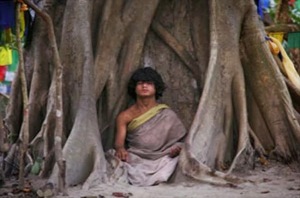 I love how Buddha didn’t try to mislead people. When asked certain difficult questions, Buddha had the composure to stay silent. He didn’t make up crap, he basically said those questions don’t matter for life on Earth. Questions like what happens after death, and do we have souls were met with his silence.
I love how Buddha didn’t try to mislead people. When asked certain difficult questions, Buddha had the composure to stay silent. He didn’t make up crap, he basically said those questions don’t matter for life on Earth. Questions like what happens after death, and do we have souls were met with his silence.
https://en.wikipedia.org/wiki/The_unanswered_questions
This is very similar to a scientist or Agnostic/Atheist who says I don’t know the answer so I’ll assume nothing until there is evidence. Christian prophets on the other hand can’t keep their mouths shut, and claim infinite revelations and Godly prophecies rather than having the maturity to say “I don’t know.” Even Jesus spoke in complicated parables when cornered. Jesus purposefully only explained the meaning of parables to his treasured disciples, so others would be misled. (Gnosticism, or “secret teachings” are the dirty little secret of Christianity that have been covered up.)
Buddhism invites practitioners to question its tenets. It eschews divine revelation, and encourages you to agree with things based on logical arguments. In it’s pure form it’s more intellectual, especially if you remove the superstition.
Buddhism is also more environmentally friendly, because it teaches you to have compassion on lower life forms. It condemns coercion, and proselytizing is not necessary because the Buddhist hell is not automatic if you don’t hear the word/have faith in Buddha’s words, nor is it eternal. Buddhism tries to take away fear and unease.
Buddhism encourages focus, meditation, and discipline. It also has a colorful worldview and folklore. Buddhism believes in multiple Buddhas for multiple universes.
Christianity is more plain and encourages people to believe the Earth is only 6,000 years old. Buddhism encourages people to think in kalpa (which are ridiculously long periods of time…around 4.32 billion years.) Thus, it’s much closer to real-life cosmology.
I haven’t thought of any good message in Christianity that a branch of Buddhism does not have.
Therefore it’s better to raise a kid as Buddhist than as a Christian.

Short version: If you cherry pick ideas from the *most* intellectual forms of one tradition and contrast those with ideas *least* intellectual forms of another, then the former looks much smarter and better…
LikeLiked by 1 person
Feel free to offer counter-examples when you reply.
LikeLike
Please note, I’m not presenting this as “the truth”, I’m just demonstrating how the technique can be flipped over (hence my use of your structure as a base). I don’t believe “Buddhism” or “Christianity” has been accurately represented in either your original post or this reply.
—–
I love how Christ didn’t try to mislead people. When asked certain difficult questions, Christ had the composure to stay silent or ask them what they thought. He didn’t make up crap, he basically said the most important questions are ones that matter for life on Earth. Questions like what happens after the Kingdom of God is realized, and when the world would end were met with encouragement to focus on the present.
A scientist who works from the current theory until there is conclusive evidence to overturn it, is very much like the Catholic Church which encourages, insists upon and even contributes to developing scientific consensus before changing its views. Buddhist sages on the other hand can’t keep their mouths shut, and claim infinite spontaneous insights and bizarre prophecies rather than having the maturity to say “I don’t know.” Even Buddha spoke in complicated parables when cornered. The Buddhist teacher Vairocana purposefully only explained the meaning of parables to his treasured disciples, so others would be misled. (Tantric Buddhism, the “secret teachings,” are the dirty little secret of Buddhism that have been covered up.) At least when Jesus spoke in parables, he’d occasionally explain them [Matthew 13:1-23].
Catholicism invites practitioners to question its tenets and investigate them through reason, even claiming this capacity is a divine gift, and encourages you to pursue understanding through logic. In it’s most revered form it is highly intellectual, especially if you consider Thomist theology and the structure of Canon Law.
Catholicism is also more environmentally friendly, because it teaches you to actively care for all life forms. It condemns coercion, and proselytizing is not necessary because the Catholic hell is not automatic if you don’t hear the word/have faith in Christ’s words. Catholicism tries to take away fear and unease [http://catholic-resources.org/Bible/HaveNoFear.htm]. Buddhism insists we’re already in, and doomed to remain in’ this hellish cycle of birth, death, and rebirth, unless we follow the Buddha’s teachings as passed down, added to, and interpreted.
Catholicism encourages focus, meditative and contemplative prayer, and discipline. It also has a colorful worldview and folklore. Catholicism believes we have paths to God through hundreds of saints that allow for diversity among people in multiple social contexts.
Buddhism is more plain and encourages people to believe the age of the Earth is based on some bronze age system of calculation, while preaching the pursuit of extinction. Catholicism encourages people to embrace modern cosmology and to wonder at the real beauty of the world. Buddhism teaches you to disappear from the world, while Catholicism tells you that what you do for people and all creatures around you is important.
I haven’t thought of any good message in Buddhism that Catholicism does not have, and plenty in Catholicism that are missing from Buddhism.
Therefore it’s better to raise a kid as a Catholic than as a Buddhist.
LikeLike
Christian morality is driven by fear while in Buddhism it is from self respect — this really says a lot about the two.
LikeLiked by 1 person
Why raise it as anything other than human?
LikeLiked by 1 person
Literally L’dOL!
LikeLike
Re: dfxc
I fixed the URLs. You can try to flip the structure and claim I’m cherry-picking, but many of the examples you’re using appear weaker and less convincing from my perspective. I also think it’s unfair that you’re conflating multiple schools of Buddhism, and comparing those to Catholicism alone. (I didn’t focus on any subset of Christianity or Buddhism, and it lets you draw contradictory examples from Buddhism while holding to a narrow Catholic viewpoint.) Even so, I still consider Buddhism better than Catholicism and I’ll explain why.
A lot of what you’re linking me to is recent Catholic revisionism, and it isn’t supported by the bible or traditional Christianity. The idea that hell is not automatic for non-Christians, or eternal is simply wrong. It’s as central to mainstream Christianity as reincarnation is to mainstream Buddhism.
I also believe the strongest points I’ve made cannot be matched by Christianity at all. I want to re-emphasize that Buddhism encourages you to consider yourself as an insignificant speck in a vast cosmology: one that has a long past, and a long future. Christianity is the opposite: it says you are unique (chosen by God by grace for a mission); the universe has had a short lifespan; and you can pollute & plunder this world because Armageddon is coming very soon, (and the Earth will be destroyed.)
That is why I believe Buddhism is better at encouraging taking responsibility for the environment (a.k.a. sustainable living.) Buddhism also encourages you to think about the long-term effect of your actions, even after you’re gone. Buddhism enables people to study sciences and other planets, and to create technologies that might benefit people in future eons; Christianity says nothing matters except following Jesus now, before it’s too late. You’ve only got once shot at heaven. Stop what you’re doing, (stop burying your father,) and just follow Jesus right now of you’ll be sorry forever.
In contrast, Buddhism says if you miss this chance to follow Buddha, someday you will definitely be offered another chance. Buddhism always offers forgiveness, and will always let you take fate into your own hands. Buddhist kids won’t have nightmares about Judgement Day from the book of Revelation.
Also, when you say Buddhism preaches the pursuit of extinction, I consider that healthier than meets the eye. It simply means accepting the finality of death, which Christianity does not accept. (I have just elaborated on the subject at that link.)
If I missed a point that you would like me to respond to, let me know. It’s easier to write replies as overviews when comparing religions.
LikeLike